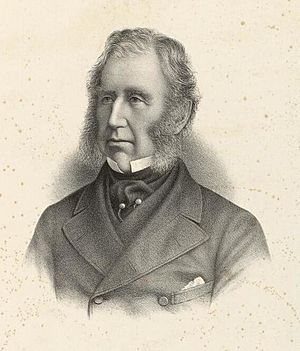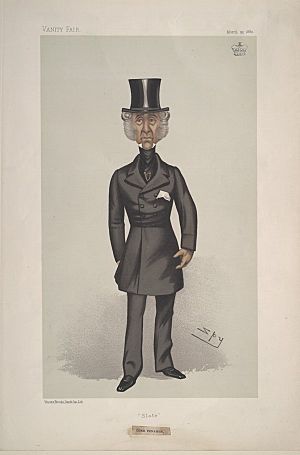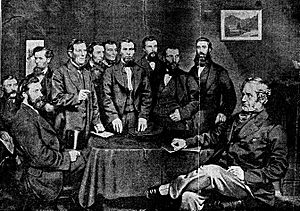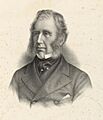Edward Douglas-Pennant, 1st Baron Penrhyn facts for kids
Quick facts for kids
The Lord Pernrhyn
|
|
|---|---|
 |
|
| Lord Lieutenant of Caernarvonshire | |
| In office 1866–1886 |
|
| Preceded by | Sir Richard Williams-Bulkeley, Bt |
| Succeeded by | John Ernest Greaves |
| Member of Parliament for Caernarvonshire |
|
| In office 1841–1866 |
|
| Preceded by | John Ormsby-Gore |
| Succeeded by | George Douglas-Pennant |
| Personal details | |
| Born | 6 June 1800 |
| Died | 31 March 1886 (age 85) |
Edward Gordon Douglas-Pennant, 1st Baron Penrhyn (born June 20, 1800 – died March 31, 1886), was a Scottish landowner. He owned large areas of land in Wales and Jamaica. He was also a politician for the Conservative Party. He played a very important role in developing the slate industry in Wales.
Contents
Life of Edward Gordon Douglas-Pennant
Edward Gordon Douglas was born the younger son of John Douglas and Lady Frances. His grandfather was James Douglas, 14th Earl of Morton. His older brother was George Douglas, 17th Earl of Morton. Edward also served as an officer in the Grenadier Guards, a famous army regiment.
Becoming a Landowner
He inherited the Penrhyn Estate near Bangor in north-west Wales. He got this land through his wife's father, George Hay Dawkins-Pennant. In 1841, he officially changed his name to Douglas-Pennant. This made him the owner of the Penrhyn Quarry near Bethesda, Wales. Under his ownership, this quarry grew to be one of the two largest slate quarries in the world.
Political Career
Edward Douglas-Pennant was also involved in politics. He was a Member of Parliament (MP) for Caernarvonshire. He served as an MP from 1841 to 1866. He also held an honorary job as the Lord Lieutenant of Caernarvonshire. This role meant he was the King's or Queen's representative in the county.
In 1852, he became a Lieutenant-Colonel and led the county's militia regiment, the Royal Carnarvon Rifles. He commanded this regiment until 1858. After that, he became its Honorary Colonel.
In 1866, he was given a special title and became Baron Penrhyn. This made him a member of the House of Lords.
Quarry and Village Development
In 1868, Lord Penrhyn fired 80 workers from Penrhyn Quarry. This happened because they did not vote for his son, George Douglas-Pennant, in a general election.
Lord Penrhyn also developed the village of Llandygai. He planned it as a "model village" for his estate workers. He did not allow any pubs or "alehouses" there. The village is just outside the walls of Penrhyn Castle. He loaned the land to the quarrymen for 30 years. The quarrymen built all the houses and roads themselves. After 30 years, Lord Penrhyn took full ownership of the land and the village.
Lord Penrhyn also made a lot of money from large farms in Jamaica. These farms relied on the work of enslaved people.
Lord Penrhyn passed away in 1886 when he was 85 years old.
Family Life
Lord Penrhyn was married twice. His first wife was Juliana Isabella Mary. They married in 1833 and had two sons and three daughters. She passed away in 1842.
In 1846, he married his second wife, Maria Louisa. They had eight daughters together. When Lord Penrhyn died, his oldest son, George, became the next Baron Penrhyn.
Images for kids
 | Leon Lynch |
 | Milton P. Webster |
 | Ferdinand Smith |




